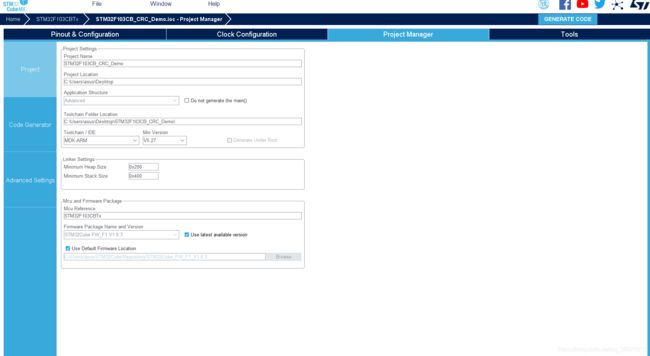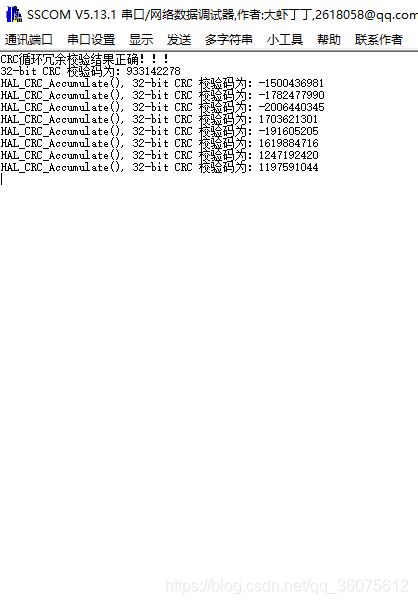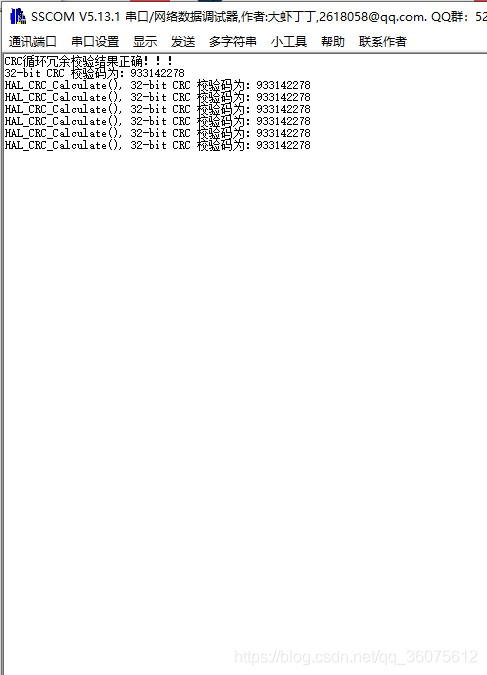STM32HAL库-自带CRC对数据冗余校验讲解
目录
概述
一、使用方法
二、STM32CubeMx配置
三、Examples
四、运行结果
五、总结
概述
本篇文章介绍如何使用STM32HAL库,自带CRC功能检验数据正确性。
硬件:STM32F103CBT6最小系统板
软件:Keil 5.29 + STM32CubeMX6.01
一、使用方法
来自百度百科介绍:
循环冗余校验(Cyclic Redundancy Check, CRC)是一种根据网络数据包或计算机文件等数据产生简短固定位数校验码的一种信道编码技术,主要用来检测或校验数据传输或者保存后可能出现的错误。它是利用除法及余数的原理来作错误侦测的。
循环冗余校验码
循环冗余校验码(CRC),简称循环码,是一种常用的、具有检错、纠错能力的校验码,在早期的通信中运用广泛。循环冗余校验码常用于外存储器和计算机同步通信的数据校验。奇偶校验码和海明校验码都是采用奇偶检测为手段检错和纠错的(奇偶校验码不具有纠错能力),而循环冗余校验则是通过某种数学运算来建立数据位和校验位的约定关系的 [2] 。
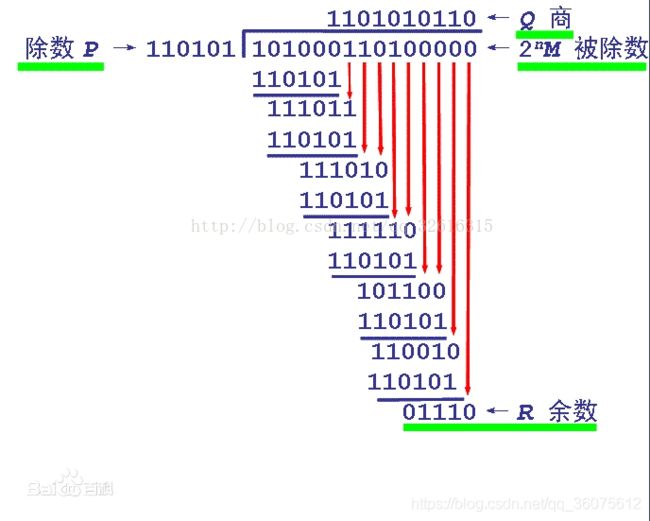
想详情了解请移步到:https://baike.baidu.com/item/CRC/1453359?fr=aladdin,这里不做过多的讲述,避免篇幅过长。
二、STM32CubeMx配置
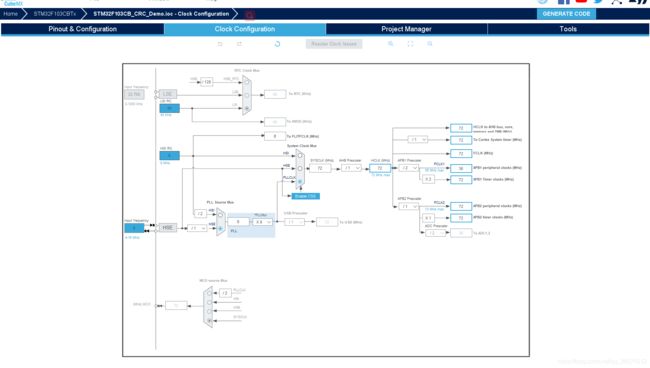
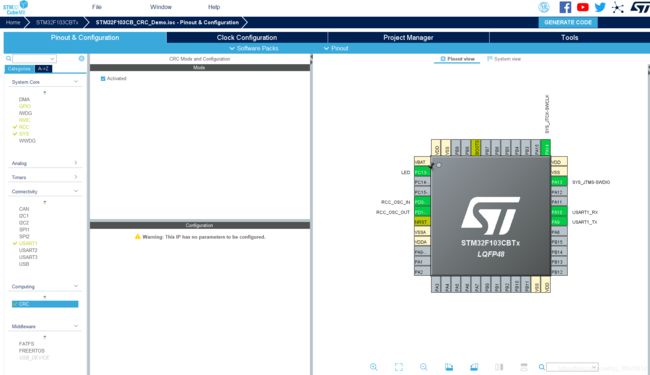
注:以上一些参数无需修改,保持默认即可。
三、Examples
main.c文件
/* USER CODE BEGIN Header */
/**
******************************************************************************
* @file : main.c
* @brief : Main program body
******************************************************************************
* @attention
*
* © Copyright (c) 2021 STMicroelectronics.
* All rights reserved.
*
* This software component is licensed by ST under BSD 3-Clause license,
* the "License"; You may not use this file except in compliance with the
* License. You may obtain a copy of the License at:
* opensource.org/licenses/BSD-3-Clause
*
******************************************************************************
*/
/* USER CODE END Header */
/* Includes ------------------------------------------------------------------*/
#include "main.h"
#include "crc.h"
#include "usart.h"
#include "gpio.h"
/* Private includes ----------------------------------------------------------*/
/* USER CODE BEGIN Includes */
#include "stdio.h"
/* USER CODE END Includes */
/* Private typedef -----------------------------------------------------------*/
/* USER CODE BEGIN PTD */
/* USER CODE END PTD */
/* Private define ------------------------------------------------------------*/
/* USER CODE BEGIN PD */
/* USER CODE END PD */
/* Private macro -------------------------------------------------------------*/
/* USER CODE BEGIN PM */
/* USER CODE END PM */
/* Private variables ---------------------------------------------------------*/
/* USER CODE BEGIN PV */
#define BUFFER_SIZE 114
/* 私有变量 ------------------------------------------------------------------*/
static const uint32_t aDataBuffer[BUFFER_SIZE] =
{
0x00001021, 0x20423063, 0x408450a5, 0x60c670e7, 0x9129a14a, 0xb16bc18c,
0xd1ade1ce, 0xf1ef1231, 0x32732252, 0x52b54294, 0x72f762d6, 0x93398318,
0xa35ad3bd, 0xc39cf3ff, 0xe3de2462, 0x34430420, 0x64e674c7, 0x44a45485,
0xa56ab54b, 0x85289509, 0xf5cfc5ac, 0xd58d3653, 0x26721611, 0x063076d7,
0x569546b4, 0xb75ba77a, 0x97198738, 0xf7dfe7fe, 0xc7bc48c4, 0x58e56886,
0x78a70840, 0x18612802, 0xc9ccd9ed, 0xe98ef9af, 0x89489969, 0xa90ab92b,
0x4ad47ab7, 0x6a961a71, 0x0a503a33, 0x2a12dbfd, 0xfbbfeb9e, 0x9b798b58,
0xbb3bab1a, 0x6ca67c87, 0x5cc52c22, 0x3c030c60, 0x1c41edae, 0xfd8fcdec,
0xad2abd0b, 0x8d689d49, 0x7e976eb6, 0x5ed54ef4, 0x2e321e51, 0x0e70ff9f,
0xefbedfdd, 0xcffcbf1b, 0x9f598f78, 0x918881a9, 0xb1caa1eb, 0xd10cc12d,
0xe16f1080, 0x00a130c2, 0x20e35004, 0x40257046, 0x83b99398, 0xa3fbb3da,
0xc33dd31c, 0xe37ff35e, 0x129022f3, 0x32d24235, 0x52146277, 0x7256b5ea,
0x95a88589, 0xf56ee54f, 0xd52cc50d, 0x34e224c3, 0x04817466, 0x64475424,
0x4405a7db, 0xb7fa8799, 0xe75ff77e, 0xc71dd73c, 0x26d336f2, 0x069116b0,
0x76764615, 0x5634d94c, 0xc96df90e, 0xe92f99c8, 0xb98aa9ab, 0x58444865,
0x78066827, 0x18c008e1, 0x28a3cb7d, 0xdb5ceb3f, 0xfb1e8bf9, 0x9bd8abbb,
0x4a755a54, 0x6a377a16, 0x0af11ad0, 0x2ab33a92, 0xed0fdd6c, 0xcd4dbdaa,
0xad8b9de8, 0x8dc97c26, 0x5c644c45, 0x3ca22c83, 0x1ce00cc1, 0xef1fff3e,
0xdf7caf9b, 0xbfba8fd9, 0x9ff86e17, 0x7e364e55, 0x2e933eb2, 0x0ed11ef0
};
__IO uint32_t uwCRCValue = 0;
/* Expected CRC Value */
uint32_t uwExpectedCRCValue = 0x379E9F06;
/* USER CODE END PV */
/* Private function prototypes -----------------------------------------------*/
void SystemClock_Config(void);
/* USER CODE BEGIN PFP */
/* USER CODE END PFP */
/* Private user code ---------------------------------------------------------*/
/* USER CODE BEGIN 0 */
#ifdef __GNUC__
/* With GCC/RAISONANCE, small printf (option LD Linker->Libraries->Small printf
set to 'Yes') calls __io_putchar() */
#define PUTCHAR_PROTOTYPE int __io_putchar(int ch)
#else
#define PUTCHAR_PROTOTYPE int fputc(int ch, FILE *f)
#endif /* __GNUC__ */
/**
* @brief Retargets the C library printf function to the USART.
* @param None
* @retval None
*/
PUTCHAR_PROTOTYPE
{
/* Place your implementation of fputc here */
/* e.g. write a character to the EVAL_COM1 and Loop until the end of transmission */
HAL_UART_Transmit(&huart1, (uint8_t *)&ch, 1, 0xFFFF);
return ch;
}
int fgetc(FILE * f)
{
uint8_t ch = 0;
HAL_UART_Receive(&huart1, (uint8_t *)&ch, 1, 0xffff);
return ch;
}
/* USER CODE END 0 */
/**
* @brief The application entry point.
* @retval int
*/
int main(void)
{
/* USER CODE BEGIN 1 */
/* USER CODE END 1 */
/* MCU Configuration--------------------------------------------------------*/
/* Reset of all peripherals, Initializes the Flash interface and the Systick. */
HAL_Init();
/* USER CODE BEGIN Init */
/* USER CODE END Init */
/* Configure the system clock */
SystemClock_Config();
/* USER CODE BEGIN SysInit */
/* USER CODE END SysInit */
/* Initialize all configured peripherals */
MX_GPIO_Init();
MX_USART1_UART_Init();
MX_CRC_Init();
/* USER CODE BEGIN 2 */
/* 进行冗余循环校验,获取校验码*/
uwCRCValue = HAL_CRC_Accumulate(&hcrc, (uint32_t *)aDataBuffer, BUFFER_SIZE);
/* 校验码与正确的校验结果对比 */
if (uwCRCValue != uwExpectedCRCValue)
{
/* Wrong CRC value */
printf("CRC循环冗余校验结果出错!!!\n");
}
else
{
/* Right CRC value */
printf("CRC循环冗余校验结果正确!!!\n");
printf("32-bit CRC 校验码为:%d\n",uwCRCValue);
}
/* USER CODE END 2 */
/* Infinite loop */
/* USER CODE BEGIN WHILE */
while (1)
{
/* USER CODE END WHILE */
/* USER CODE BEGIN 3 */
}
/* USER CODE END 3 */
}
/**
* @brief System Clock Configuration
* @retval None
*/
void SystemClock_Config(void)
{
RCC_OscInitTypeDef RCC_OscInitStruct = {0};
RCC_ClkInitTypeDef RCC_ClkInitStruct = {0};
/** Initializes the RCC Oscillators according to the specified parameters
* in the RCC_OscInitTypeDef structure.
*/
RCC_OscInitStruct.OscillatorType = RCC_OSCILLATORTYPE_HSE;
RCC_OscInitStruct.HSEState = RCC_HSE_ON;
RCC_OscInitStruct.HSEPredivValue = RCC_HSE_PREDIV_DIV1;
RCC_OscInitStruct.HSIState = RCC_HSI_ON;
RCC_OscInitStruct.PLL.PLLState = RCC_PLL_ON;
RCC_OscInitStruct.PLL.PLLSource = RCC_PLLSOURCE_HSE;
RCC_OscInitStruct.PLL.PLLMUL = RCC_PLL_MUL9;
if (HAL_RCC_OscConfig(&RCC_OscInitStruct) != HAL_OK)
{
Error_Handler();
}
/** Initializes the CPU, AHB and APB buses clocks
*/
RCC_ClkInitStruct.ClockType = RCC_CLOCKTYPE_HCLK|RCC_CLOCKTYPE_SYSCLK
|RCC_CLOCKTYPE_PCLK1|RCC_CLOCKTYPE_PCLK2;
RCC_ClkInitStruct.SYSCLKSource = RCC_SYSCLKSOURCE_PLLCLK;
RCC_ClkInitStruct.AHBCLKDivider = RCC_SYSCLK_DIV1;
RCC_ClkInitStruct.APB1CLKDivider = RCC_HCLK_DIV2;
RCC_ClkInitStruct.APB2CLKDivider = RCC_HCLK_DIV1;
if (HAL_RCC_ClockConfig(&RCC_ClkInitStruct, FLASH_LATENCY_2) != HAL_OK)
{
Error_Handler();
}
}
/* USER CODE BEGIN 4 */
/* USER CODE END 4 */
/**
* @brief This function is executed in case of error occurrence.
* @retval None
*/
void Error_Handler(void)
{
/* USER CODE BEGIN Error_Handler_Debug */
/* User can add his own implementation to report the HAL error return state */
/* USER CODE END Error_Handler_Debug */
}
#ifdef USE_FULL_ASSERT
/**
* @brief Reports the name of the source file and the source line number
* where the assert_param error has occurred.
* @param file: pointer to the source file name
* @param line: assert_param error line source number
* @retval None
*/
void assert_failed(uint8_t *file, uint32_t line)
{
/* USER CODE BEGIN 6 */
/* User can add his own implementation to report the file name and line number,
tex: printf("Wrong parameters value: file %s on line %d\r\n", file, line) */
/* USER CODE END 6 */
}
#endif /* USE_FULL_ASSERT */
/************************ (C) COPYRIGHT STMicroelectronics *****END OF FILE****/
四、运行结果
HAL_CRC_Accumulate()函数,可以发现,每次的结果都不同(图a),这是因为DR寄存器没有清,会使用的DR寄存器的结果来进行本次计算。
HAL_CRC_Calculate()函数,可以发现,得到的结果是一样的(图b)。
【注】关于CRC的更多内容可以自行查阅相关资料,笔者这里推荐一篇文章A PAINLESS GUIDE TO CRC ERROR DETECTION ALGORITHMS,感兴趣的朋友自己去看看吧。
传送门->代码
参考文章:https://bruceou.blog.csdn.net/article/details/115041203
五、总结
好了,就介绍到此。

